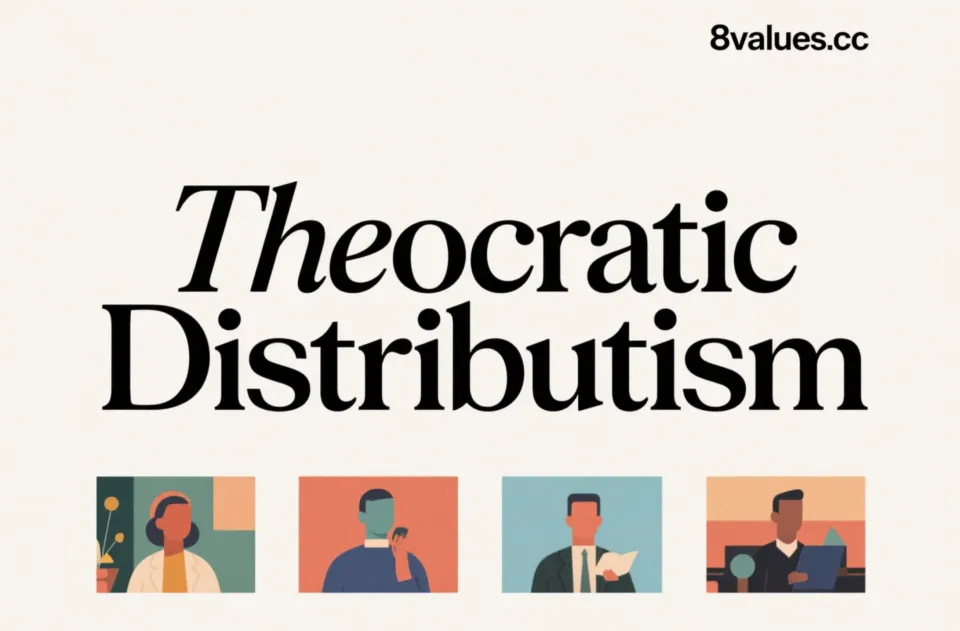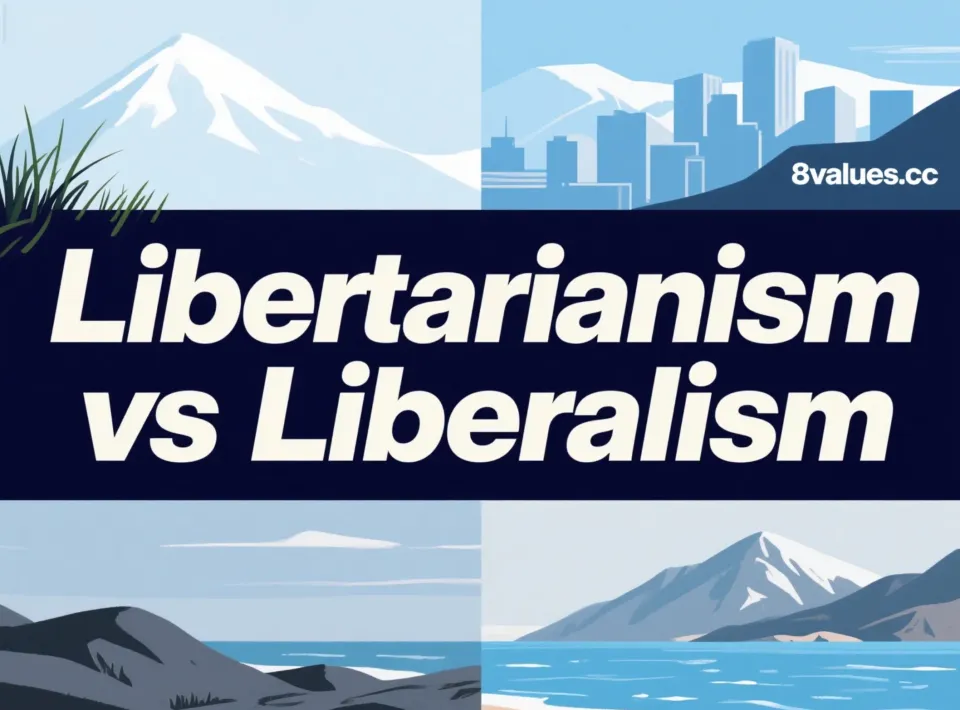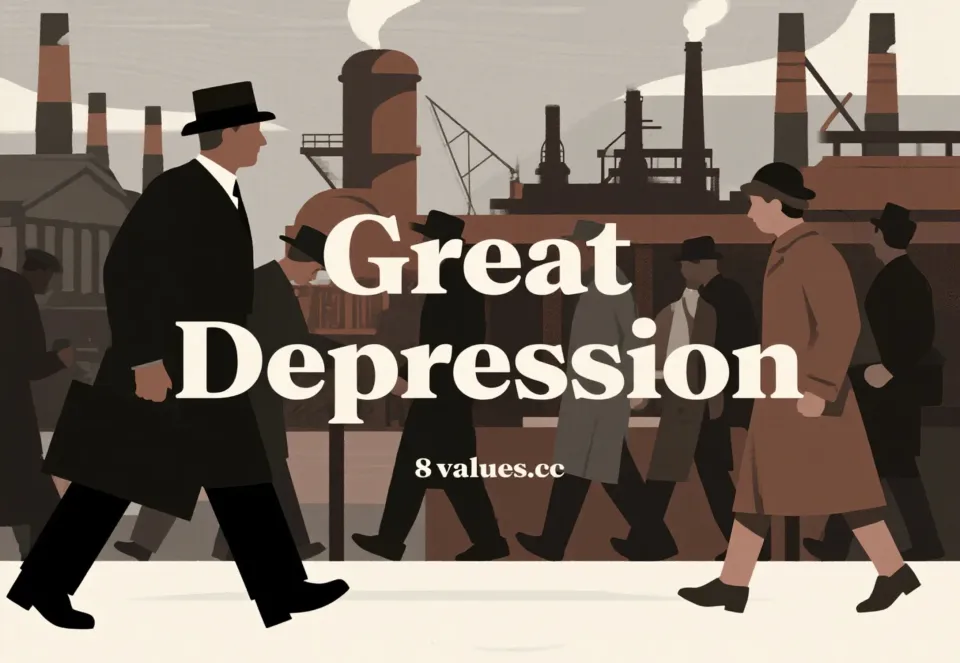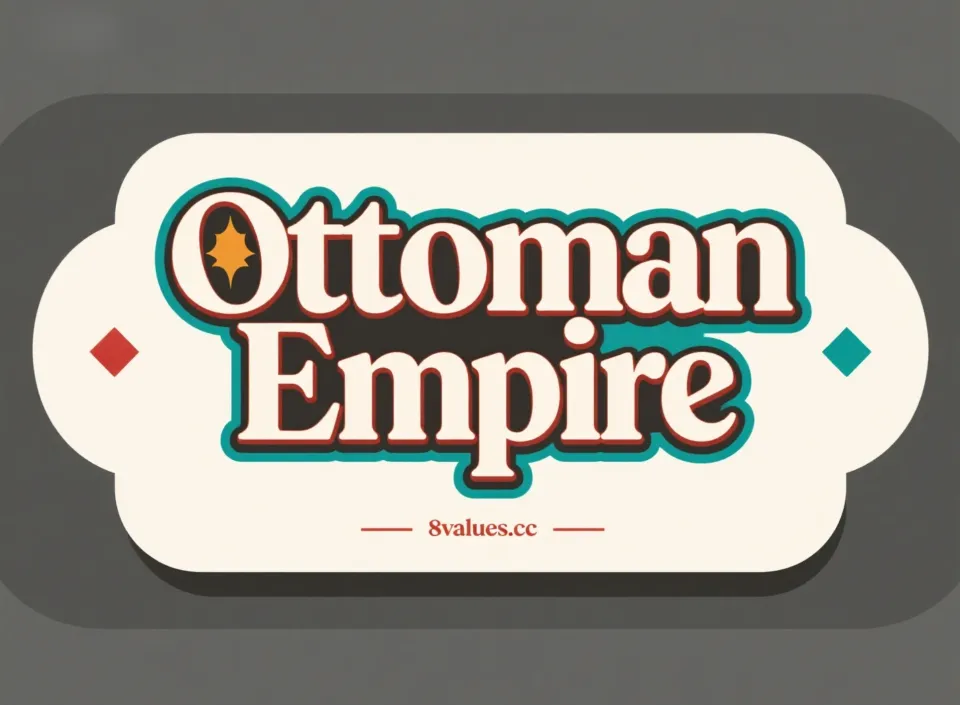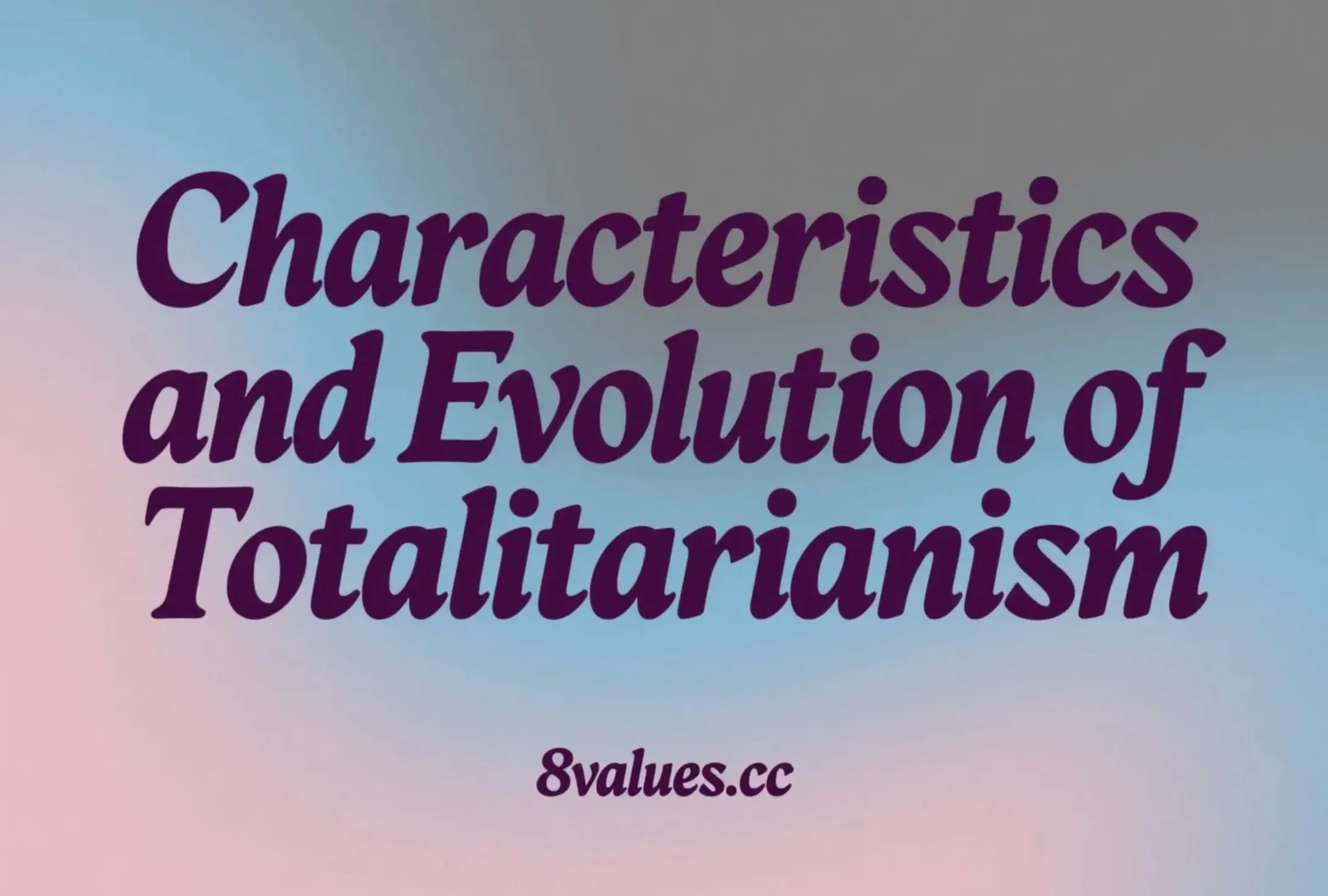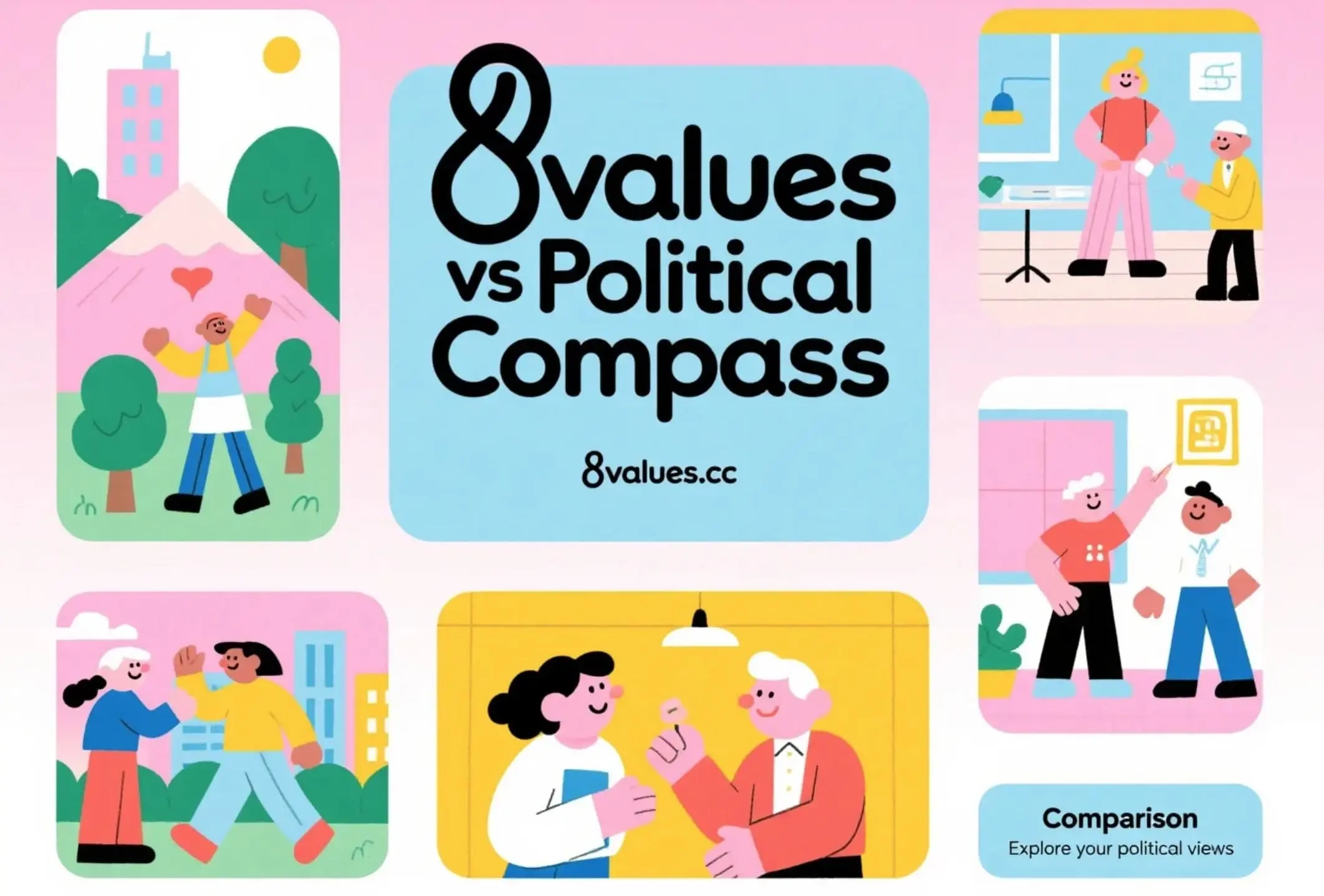Theocratic Distributism | 8values Interpretation of ideological ideology of political tests
Deeply explore Theocratic Distributism, a unique political ideology that combines religious authority with economic distribution concepts. Understand its core principles, historical context, performance in the 8Values political orientation test, and challenges faced. Through this article, you will have a more comprehensive and professional understanding of this complex idea and can explore more political stances in the 8 Values Political Inclination Test.
Theocratic Distributism is a compound ideological system that combines the religious authority of Theocracy with the economic distribution principle of Distributism . It is not a widely recognized or well-defined theory in mainstream political science, economics or theology, but more of a concept that emerges in online platforms such as 8Values Political Ideology Testing and Reddit community discussions. This theory attempts to find a "third path" between centralized capitalism and national socialism, but it has a strong religious authority.
What is theocratic decentralization?
The core of Theocratic Distributism lies in two components of its name: "theocratic politics" and "professionalism". Understanding these two independent concepts is the key to understanding their fusion form.
Core Principles of Distributism
Distributism is an economic theory that advocates that the world's productive assets should be widely owned by individuals or families, rather than concentrated in the hands of a few elites (capitalism) or states (socialism). It rose in the late 19th and early 20th century and was deeply influenced by Catholic social teaching, especially the encyclical "Rerum novarum" by Pope Lenius in 1891 and the Quadragesimo anno in 1931.
Proletarians believe that private property rights are a fundamental right and advocate a society characterized by broad property ownership. It supports small-scale independent handicraftsmen, producers , or through cooperatives, mutual member aid organizations , and small and medium-sized enterprises to achieve their economic goals. The theory also advocates the restriction or elimination of excessively concentrated economic power through strong antitrust laws .
The main economic and social principles of proletarianism include:
- Wide private property ownership : Encourage people to own and work on their own land, believing that this will inspire greater efforts and commitment to benefit individuals and their families. This wide distribution is mainly aimed at productive property , i.e. resources that can create wealth, such as land and tools.
- Redistribution of wealth and productive assets : The means of production are widely distributed to the general public through direct distribution of productive assets, taxing excess property, and subsidizing small enterprises.
- Guild system : Advocate the restoration of the guild system to regulate the industry, promote professional ethics and economic equality among members, and pay attention to business behavior, working conditions and professional training standards.
- Cooperative banks : prefer cooperative financial institutions such as credit unions, housing construction mutual aid associations and mutual aid banks, rather than private banks.
- The centrality of the Human family : families and residences are seen as the core of society, and individual possession of property is the basis for building and supporting the family.
- Subsidiarity : Emphasizes that no larger social, economic or political unit should assume the functions that smaller units can complete, and decisions should be made at the lowest level as possible.
- Moral economic concept : Economic activities should be subject to the whole of human life, including spiritual, intellectual and family life, rather than simply pursuing profits.
The Essence of Theocracy
Theocracy is a form of government in which one or more deities are considered the highest authority of domination, providing divine guidance through human mediation (usually religious leaders or clergy), exercising administrative, legislative and/or judicial powers, and managing the daily affairs of the government. This word originated from the ancient Greek word "theocratia", meaning "the rule of God". In the theocracy, the law is often based on religious classics, and religious leaders have the ultimate political decision-making power. The legitimacy of state governance comes directly from religious beliefs.
Unique Aspects of the Fusion
When "theocratic politics" is combined with "property-separationism", Theocratic Distributism envisions a social governance model based on religious beliefs and emphasizes widespread property distribution . Its potential characteristics include:
- Religion-dominated social structure : Specific religious doctrines (such as Christianity, Islam, etc.) are regarded as the cornerstone of state governance and social norms, and political decisions must be consistent with divine values.
- The religious basis of economic justice : Economic policies and market behaviors are bound by religious ethics, such as prohibiting usury, advocating fair pricing, helping the poor, etc., to ensure that economic distribution is in line with moral justice.
- Oppose Wealth Concentration : Based on religious morality, it opposes capitalist greed and socialist atheism, and advocates the wide distribution of property through cooperatives under religious guidance, church land distribution and small peasant economy.
- Family and church-centered social structure : Emphasizes the values of traditional family and the central role of church communities in economic life.
- The double monopoly of theocracy and the economy : Religious institutions may have both the power and the economic distribution rights, and formulate resource allocation rules through "oracles" or doctrines.
This ideology is usually regarded as economically left-leaning and socially right-leaning , that is, economically pursuing equal distribution and decentralization, while socially maintaining traditional moral and religious authority.
Theoretical origins and historical background of theocratic division
The idea of theocratic proletarianism has a complex origin and integrates Catholic social doctrines and Christian conservative thoughts.
Foundations in Catholic Social Teaching
The theoretical foundation of proletarianism mainly comes from Catholic social teaching:
- Pope LexiIII's "New Things" encyclopedia (Rerum Novarum, 1891) : This encyclopedia is regarded as the cornerstone of the discipline of modern Catholic society, and it criticized the disadvantages of capitalist exploitation and the collectivization of national socialism brought about by the industrial revolution. The encyclical emphasized labor rights, the popularity of private property, fair wages, and the right of workers to organize trade unions, and advocated that as many people as possible become property owners.
- Pope Pius XI's "Forty Years Encyclopedia" (Quadragesimo Anno, 1931) : This encyclopedia further elaborates on the principle of auxiliary nature, reaffirms criticism of capitalism and socialism, and advocates that economic activities should serve the common interests.
Key Thinkers and Advocates
GK Chesterton and Hilaire Belloc were the earliest and most determined advocates of proletarianism. In his book The Servile State, Bellock warns that if capitalism does not reform, it may lead to a “state of slavery” where most people remain proletarian wage slaves. Chesterton vividly summarized the ideal of proletarianism with the slogan of "Three acres per cow", emphasizing small-scale production and family self-sufficiency.
Historical Practices and Modern Influence
Although no country fully practices the complete framework of theocratic division, its philosophy is reflected in some movements in history and in modern times:
- Guild System in Medieval Europe : Under the guidance of Catholic doctrine, the guild of artisans balanced resource allocation by ensuring fair wages and limiting pricing, which reflects the germination of the idea of division of production.
- Early Christian Commune : The "common things" of the Jerusalem church recorded in Acts can be regarded as a practice of sharing property based on faith.
- Catholic Worker Movement : Founded by Dorothy Day and Peter Maurin, it attempts overprofessionalism in practice, such as building mutual farms and Hospitality Houses.
- Modern Christian democratic movement : Christian democratic parties such as the American Solidarity Party advocate the principle of proletarianism in their economic policies and party programs. Romania's presidential candidate Călin Georgescu also advocated proprietorism.
- Iran's Corporate Technique : As a "theocratic republic", contemporary Iran has dominated the allocation of economic resources, combining religious welfare and social security, and reflects an attempt to combine religious law with traditional economic models.
- Mondragon Corporation : Founded by a Catholic priest, it was influenced by the Catholic socio-economic doctrine that inspired proletarianism.
Economic Model: Broad Ownership and Religious Ethics
The economic model of the theocracy and proletarianism opposes the state's centralized planned economy and the large capital market economy. It advocates an economic system with decentralized property rights and religious ethics as its core:
- Extensive small-scale private property ownership : The ideal society consists of small capitalists, family farms, workers' cooperatives and small handicraftsmen, limiting the accumulation of large-scale land or factories.
- Economic rules based on religious ethics : economic behavior needs to be consistent with religious morality, such as prohibition of usury, promotion of fair prices, employer obligations to workers, and helping the poor through religious charity (such as the "zakat" of Islam).
- Families and local communities are economic units : encourage small-scale, self-sufficiency local economic models, reduce state intervention in grassroots economies, and limit commercialization and leasing economies to maintain fairness in property distribution.
- Mutual assistance, cooperation and charity spirit : social management is carried out through intermediate organizations such as cooperatives, guilds and mutual aid associations to maintain vulnerable groups in society.
Political Governance: Religious Authority and Social Order
Theocratic proletarianism emphasizes the core role of religion in politics and believes that religious morality is the fundamental standard of social law.
- The supremacy of religious law : social order and law are based on religious doctrines, and the laws and policies of the state come directly from religious beliefs.
- The guiding role of religious leaders : maintaining social order and traditional values through theories. Religious leaders or rulers elected according to religious principles have a decisive guiding role in public affairs.
- Authoritative tendency : It is very different from the modern democratic state that is completely secularized, which emphasizes theocracy over civil rights , reflecting a clear authoritative tendency.
- Social cohesion : Strengthen social cohesion through religious doctrine, regard economic distribution as a "sacred obligation", oppose class struggle, and advocate reconciliation of class contradictions through religious morality.
The tendency of the theocracy in the 8Values test
In the 8 Values political test, Theocratic Distributism is usually reflected in the following dimensions:
| Dimension | tendency | illustrate |
|---|---|---|
| Equality vs. Markets | Positively dispersed private property | Support the popularization of small property and oppose monopoly capital and state control |
| Democracy (Authority vs. Liberty) | Inclined to authoritarianism | Religious authority is preferred, emphasizing order and tradition |
| Society (Tradition vs. Progress) | Strong traditionalism | Advocate religious and cultural traditions and oppose radical change |
| Diplomacy (Nation vs. Globe) | Facing nationalism | Maintain religious culture and national identity, emphasize local communities |
If you are curious about your political stance, you can visit the 8Values Political Propensity Test now, or check out the Ideology Collection to learn more about the results.
Comparison with mainstream ideology
Theocratic Distributism, which is economically and politically significant from mainstream ideology, seeks to provide a unique "third path":
| Thought system | Attitude to religion | Attitude to the economy | Attitude to authority | Key differences |
|---|---|---|---|---|
| Theocratic property | Advocate religious authority | Disperse private property; cooperatives are preferred | Authoritativeism | Religion guides economy and politics, emphasizing small family property rights |
| Free will capitalism | Usually secular | Support market freedom; concentrate property | Anti-authority | Emphasize market and individual freedom and oppose religious intervention |
| socialism | Secondary or none (possibly objected) | Collectively owned by the state | National centralization | Kill personal motivation; property is not sacred |
| Christian Democracy | Influencing policy | Social market economy; welfare | Parliamentary Democracy | Relatively moderate; not completely anti-monopoly and do not advocate theocracy |
Realistic challenges and criticism
Although Theocratic Distributism offers a unique socio-economic vision, it also faces many real-life challenges and criticisms:
- Practical feasibility : In modern complex and globalized economic systems, it is considered extremely difficult to achieve this utopian ideal on a large scale.
- The issue of freedom : The close integration of religious doctrine with political and economic power may lead to suppression of freedom of thought, religious diversity, personal freedom, and the rights and interests of minorities.
- Questions about economic efficiency : Emphasizing small-scale production and localization may be difficult to produce economies of scale and may even hinder technological innovation and application.
- Fuzzy definition and interpretation rights : This concept itself is vague in definition and lacks systematic practical models or academic support. At the same time, there may be huge differences within the specific understanding and application of religious doctrines, and it is a difficult problem to decide who can "comply with doctrines".
- Potential risk of abuse of power : Historical cases show that the theocratic economic model may cause turmoil due to unfair resource allocation, and even evolve into a privileged tool for the theocratic elite, exposing its vulnerability.
- Conflict with secularized society : In an increasingly secular modern society, theocratic proletarianism is often criticized as "anti-modernization."
Could you be suitable for theocratic decentralization?
If you show a strong traditionalist and authoritative tendency in the self-test of 8Values political ideological tendency and agree with the following views, you may be in line with the philosophy of Theocratic Distributism:
- It is believed that religion should be the guiding principle of social and political life;
- Supports widespread small property rights and family economic autonomy;
- Advocate traditional cultural and religious values;
- Oppose the centralization and excessive marketization of capitalism.
Conclusion
Theocratic Distributism, as a unique political and economic ideology, combines religious authority with economic decentralization, proposes a "third path" different from capitalism and socialism. Although it is still a theoretical and synthetic concept with no mature real state practice, it provides a critical perspective and theoretical support for those groups pursuing social moral order and economic equity. It reflects the critical and alternative ideas of modern capitalism and secular states by some traditionalist or religious conservatives.
To further explore more political stances and ideology, please visit the complete collection of ideological results to learn about the complete 8Values test results and corresponding explanations. Also, follow our official blog for more in-depth discussions and latest insights on political and philosophical topics.
